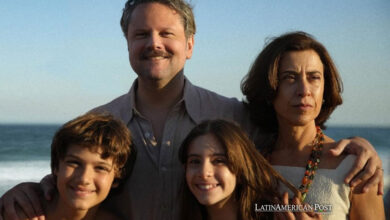Review of “The Worst Person In The World”: a new youth
The new film by Joachim Trier has already premiered on Latin American billboards. This is our review of "The Worst Person In The World" .

Photo: IMDB
LatinAmerican Post | Luis Alberto Garduño Guerrero
Listen to this article
Leer en español: Reseña de “La peor persona del mundo”: una nueva juventud
There is a new paradigm around the youth of today. It is increasingly common to hear that young couples consider the idea of not having children; there are multiple debates about the role of women today; there are questions about what success is; there is a concern about global warming and large etcetera on the list of questions. Youth is the theme that the Norwegian director Joachim Trier brings to the table through the long-awaited premiere in Latin America of the film "The Worst Person in the World", with which he concludes his Oslo trilogy. That is why in this article we present what it is about and why to watch it.
Julie is a young woman searching for meaning in her life. She constantly questions the direction his professional life is taking, which is why he changes careers. Medicine, psychology, and, finally, photography. The last one is what she decides to do, so he ends up working in a bookstore to give himself time to discover what she wants. In the love field, Julie is not satisfied either. She doesn't know what she wants in a relationship, but what she is sure of is what she doesn't want: to become a mother.
Winner of the Palme d'Or at the Cannes Festival and nominated for an Oscar for best foreign film, "The Worst Person In The World" is a 2021 Norwegian film starring Renate Reinsve, who was also awarded for her performance at the Cannes Festival, Anders Danielsen, and Herbert Nordrum. This is the third part of the trilogy by director Triers.
"The Worst Person In The World" is a dynamic, entertaining film told through twelve chapters that show us the story of a young woman in search of her own destiny. This film shows us in a deeper way the questions and doubts that today's young people raise. It puts on the table the theme of motherhood from a perspective that is often given on the realization of women, not only from a perspective of a social burden but also, as it is told by the protagonist, from a personal perspective.
It may interest you: Review: "The Northman" and the folkloric cinema of Robert Eggers
The Oslo Trilogy
In 2006, Joachim Trier presented his film debut with the film "Reprise", the first part of the trilogy. It dealt with the story of two young writers, Erik and Phillip, who are about to publish their first novels. However, fame comes to Phillip when his novel is published before his friends. The second part would come with the film "Oslo, August 31", released in 2011, which tells the story of Anders, a young drug addict in the process of detoxification who tries to commit suicide, which leads him on a journey of considering what he has done with his life at such a young age.
These films have in common the theme of youth approached from different perspectives. Perhaps we can think that being set in Norway, a first-world country with social problems different from those of Latin America, we could not identify with the theme. However, the theme goes beyond a privileged perspective. What it proposes is a paradigm of the new youth in which the idea of success, the idea of age, the role of women in society, or very current themes are questioned more. Triers engage in a dialogue with completely different narratives and characters through his three films in which he captures the idea of the search for meaning that each person gives to existence. That is why this film cannot go unnoticed.



